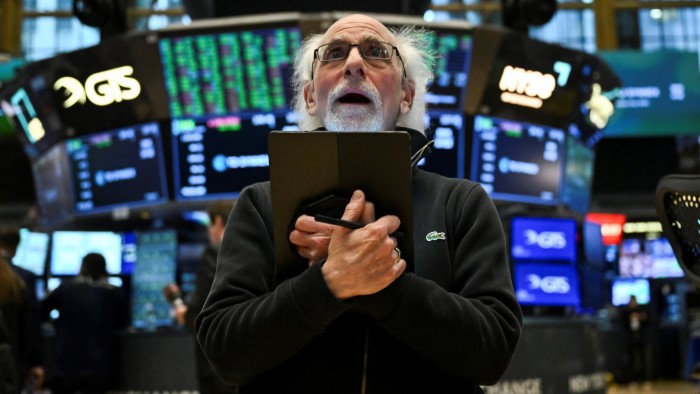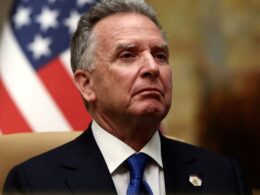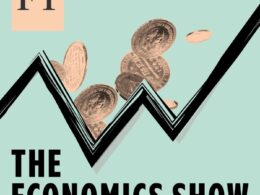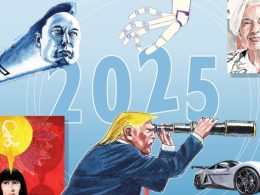This article is an on-site version of our FirstFT newsletter. Subscribers can sign up to our Asia, Europe/Africa or Americas edition to get the newsletter delivered every weekday morning. Explore all of our newsletters here
Good morning and welcome back to FirstFT Asia. In today’s newsletter:
Donald Trump has announced a 90-day pause in additional tariffs on a wide range of countries willing to negotiate with the US, sending stocks surging as the president backed down from a full-blown trade war.
Massive rally on Wall Street: US equities soared immediately after Trump’s announcement, with the blue-chip S&P 500 closing up 9.5 per cent and the Nasdaq Composite surging more than 12 per cent. It was the best day for the S&P 500 since 2008 and the strongest for the Nasdaq since 2001. The furious rally added about $4.3tn to the market value of the S&P 500, helping reverse the heavy losses posted for US stocks since Trump announced his wide-ranging tariffs a week ago.
When asked to detail his decision to reverse most of his tariffs, the president appeared to acknowledge some of the fear in the markets sparked by his trade war. “Well, I thought that people were jumping a little bit out of line. They were getting yippie, you know, they were getting . . . a little bit afraid,” he told reporters.
Not a total climbdown: While Trump paused his “reciprocal” tariffs on most countries, he singled out China for further levies. The US president said he was increasing his additional levies on the world’s second-largest economy to 125 per cent, saying China had showed a “lack of respect” by retaliating against US tariffs. Trump’s escalation against China came after Beijing said it would impose an additional retaliatory tariffs of 50 per cent on US goods on top of 34 per cent already announced, a measure that would take effect after midday in Beijing.
Trump also said he was still maintaining the 10 per cent blanket levy on most imports from around the world that took effect on April 5.
What happens next?: The climbdown ushers in a phase of what are expected to be multiple, parallel trade negotiations between the US and its top trading partners over the coming weeks. Bessent on Tuesday announced he would lead talks with Japan, alongside Trump’s top trade negotiator, Jamieson Greer, in an effort to strike a deal that could lead to tariffs being lowered.
Follow the latest updates on our live blog.
For more analysis on the tariffs, sign up for our Trade Secrets newsletter if you’re a premium subscriber, or upgrade your subscription. Here’s what else we’re keeping tabs on today:
-
Economic data: China and the US report March inflation figures. Taiwan releases March trade data.
-
Spanish PM in Asia: Pedro Sánchez begins a two-day visit to Vietnam, where he’ll meet the country’s Communist party leadership, before travelling to China. (Reuters)
-
Monetary policy: The Philippines announces its interest rate decision.
Join Unhedged’s Robert Armstrong and other FT experts on April 23 for a subscriber-only webinar, as they break down how Trump’s policies are reshaping markets. Register for free.
Five more top stories
1. Apple has increased the number of flights carrying consignments of iPhones from India to the US following Trump’s aggressive China tariffs, as the company grapples with one of the biggest threats to its business in years. Two Indian officials told the FT that the US tech giant was looking at further investment into the country. “Apple is definitely thinking of doing more in India,” said one official.
2. Volodymyr Zelenskyy said Ukrainian intelligence had identified 155 Chinese nationals who had signed contracts with Russia’s armed forces to fight in Ukraine. The Ukrainian president accused Beijing of doing nothing to stop Russia’s recruitment of its citizens. “China’s top leaders are aware,” he said.
3. The top investor at Australia’s largest superannuation fund says the US will continue to dominate its new investments despite market chaos caused by tariffs, in a vote of confidence from one of the most active foreign investors in the world’s largest economy. AustralianSuper’s chief investment officer told the FT that the US was still attractive on a long-term basis.
4. The Trump administration is threatening to terminate hundreds of billions of dollars’ worth of consulting contracts, after finding US firms’ proposals for savings to be “insulting”. In a letter being sent to 10 large consulting groups this week, the US government accuses the firms of “faulty reasoning, financial obfuscations and gamesmanship” in their discussions with the administration.
5. Elon Musk’s Starlink is in a fight with Canada’s top telecoms group over accessing millions of dollars in subsidies, as the country’s growing anti-US sentiment puts the billionaire’s satellite business under further scrutiny. Bell and its subsidiary Northwestel are lobbying the Canadian authorities to prevent Starlink from getting financial support for internet providers that serve the country’s North region, which includes the Arctic
Visual story
China’s domination of global trade has led to a schism with the US and left many other countries worried about their industries being crushed by Beijing’s export machine. Our latest visual story explores how the country’s record trade surplus helped spark Trump’s tariff war.
We’re also reading . . .
-
Trump ‘bro-sphere’: The conservative podcasters who helped the US president get elected are being tested by the massive fallout from his tariffs.
-
Rice crisis: The future of one of the world’s most important foodstuffs is mired in a stew of science, politics and economics, writes Anjana Ahuja
-
Performance-based lay-offs: For affected staff looking to continue their career elsewhere, such targeted cuts can be a worrying black mark.
Graphic of the day
China’s deep electronics and EV supply chain has given the country a head start in the race to create humanoid robots, with many of the components already made in the country and included in electric vehicles.

Take a break from the news . . .
. . . and read HTSI’s profile of Kim Sung-joo, the South Korean entrepreneur who turned MCM Worldwide into a global phenomenon with one simple idea: a backpack. “My team told me I was crazy . . . [but] I saw a paradigm shift.”

Source link









